不定代词讲解
不定代词的用法
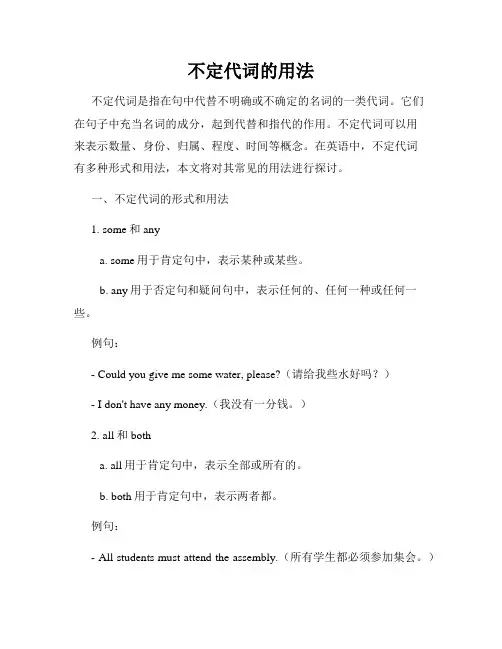
不定代词的用法不定代词是指在句中代替不明确或不确定的名词的一类代词。
它们在句子中充当名词的成分,起到代替和指代的作用。
不定代词可以用来表示数量、身份、归属、程度、时间等概念。
在英语中,不定代词有多种形式和用法,本文将对其常见的用法进行探讨。
一、不定代词的形式和用法1. some和anya. some用于肯定句中,表示某种或某些。
b. any用于否定句和疑问句中,表示任何的、任何一种或任何一些。
例句:- Could you give me some water, please?(请给我些水好吗?)- I don't have any money.(我没有一分钱。
)2. all和botha. all用于肯定句中,表示全部或所有的。
b. both用于肯定句中,表示两者都。
例句:- All students must attend the assembly.(所有学生都必须参加集会。
)- Both of them are my friends.(他们两个都是我的朋友。
)3. each和everya. each表示每一个(两者或两者以上的人或事物)。
b. every表示每一个(三个或三个以上的人或事物)。
例句:- Each student should bring their own books.(每位学生应该带自己的书。
)- Every child loves ice cream.(每个孩子都喜欢冰淇淋。
)4. someone和anyonea. someone用于肯定句中,表示某人或有人。
b. anyone用于否定句和疑问句中,表示任何人或任何一人。
例句:- I saw someone waiting for you at the station.(我看到有人在车站等你。
)- Have you seen anyone around here?(你在这附近见过任何人吗?)5. something和anythinga. something用于肯定句中,表示某物或有物。
不定代词one,ones,either,neither,both,all的知识讲解
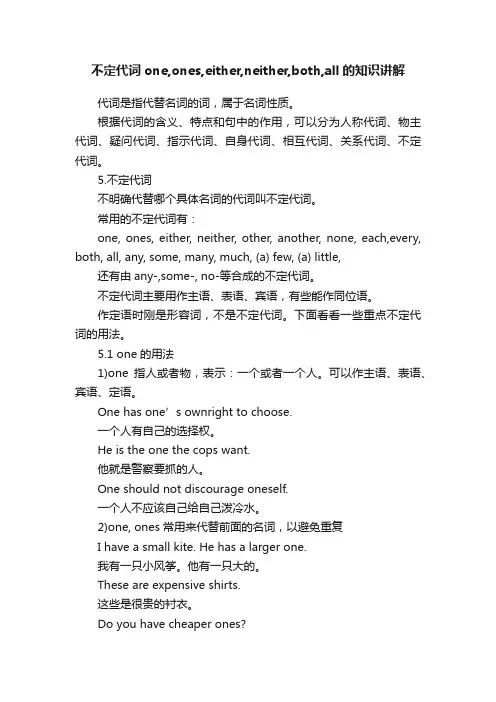
不定代词one,ones,either,neither,both,all的知识讲解代词是指代替名词的词,属于名词性质。
根据代词的含义、特点和句中的作用,可以分为人称代词、物主代词、疑问代词、指示代词、自身代词、相互代词、关系代词、不定代词。
5.不定代词不明确代替哪个具体名词的代词叫不定代词。
常用的不定代词有:one, ones, either, neither, other, another, none, each,every, both, all, any, some, many, much, (a) few, (a) little,还有由any-,some-, no-等合成的不定代词。
不定代词主要用作主语、表语、宾语,有些能作同位语。
作定语时刚是形容词,不是不定代词。
下面看看一些重点不定代词的用法。
5.1 one的用法1)one指人或者物,表示:一个或者一个人。
可以作主语、表语、宾语、定语。
On e has one’s ownright to choose.一个人有自己的选择权。
He is the one the cops want.他就是警察要抓的人。
One should not discourage oneself.一个人不应该自己给自己泼冷水。
2)one, ones常用来代替前面的名词,以避免重复I have a small kite. He has a larger one.我有一只小风筝。
他有一只大的。
These are expensive shirts.这些是很贵的衬衣。
Do you have cheaper ones?有便宜些的吗?5.2 either, neither,both用法either:两者中的一个(任何一个);neither:两者全否定,一个都没有;both:两者全肯定。
Either is right.哪一个都对。
(作主语)Neither is wrong.两个都没错。
英语中不定代词few, little, many, much的讲解
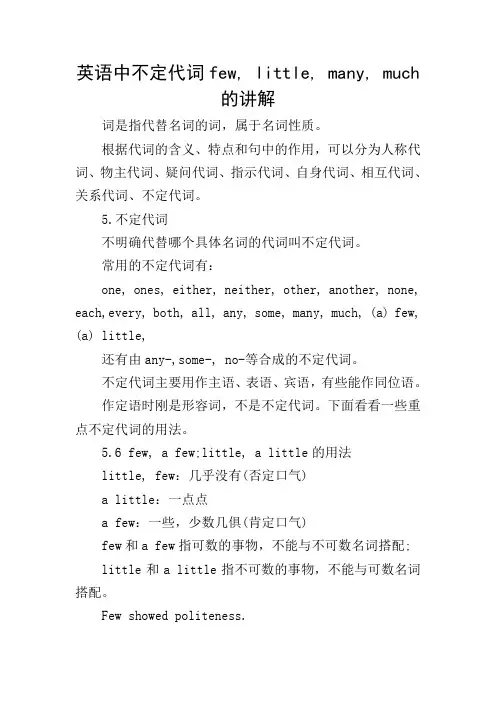
英语中不定代词few, little, many, much的讲解词是指代替名词的词,属于名词性质。
根据代词的含义、特点和句中的作用,可以分为人称代词、物主代词、疑问代词、指示代词、自身代词、相互代词、关系代词、不定代词。
5.不定代词不明确代替哪个具体名词的代词叫不定代词。
常用的不定代词有:one, ones, either, neither, other, another, none, each,every, both, all, any, some, many, much, (a) few, (a) little,还有由any-,some-, no-等合成的不定代词。
不定代词主要用作主语、表语、宾语,有些能作同位语。
作定语时刚是形容词,不是不定代词。
下面看看一些重点不定代词的用法。
5.6 few, a few;little, a little的用法little, few:几乎没有(否定口气)a little:一点点a few:一些,少数几俱(肯定口气)few和a few指可数的事物,不能与不可数名词搭配;little和a little指不可数的事物,不能与可数名词搭配。
Few showed politeness.没有几个人表示礼貌。
A few showed politeness.有少数几个人表示了礼貌。
We know little about the new machine.我们对这台新机器几乎一无所知。
We know a little about the new machine.我们对这台新机器有一点了解。
Few visitors have arrived.客人到来的还没有几个。
A few parks will be built in the suburbs.在郊区将建几座公园。
There was little water to drink.当时没什么水可喝了。
There was a little water to drink.当时还有一点点水可喝了。
不定代词的分类和用法
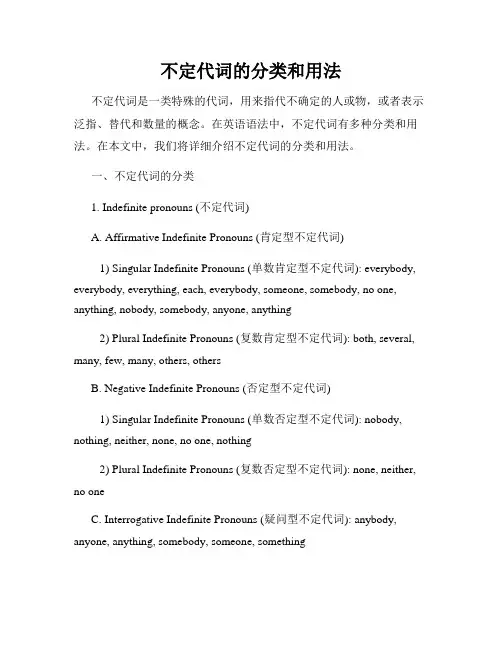
不定代词的分类和用法不定代词是一类特殊的代词,用来指代不确定的人或物,或者表示泛指、替代和数量的概念。
在英语语法中,不定代词有多种分类和用法。
在本文中,我们将详细介绍不定代词的分类和用法。
一、不定代词的分类1. Indefinite pronouns (不定代词)A. Affirmative Indefinite Pronouns (肯定型不定代词)1) Singular Indefinite Pronouns (单数肯定型不定代词): everybody, everybody, everything, each, everybody, someone, somebody, no one, anything, nobody, somebody, anyone, anything2) Plural Indefinite Pronouns (复数肯定型不定代词): both, several, many, few, many, others, othersB. Negative Indefinite Pronouns (否定型不定代词)1) Singular Indefinite Pronouns (单数否定型不定代词): nobody, nothing, neither, none, no one, nothing2) Plural Indefinite Pronouns (复数否定型不定代词): none, neither, no oneC. Interrogative Indefinite Pronouns (疑问型不定代词): anybody, anyone, anything, somebody, someone, somethingD. Universal Indefinite Pronouns (全称型不定代词): all, both, each, every, any, either, neitherE. Distributive Indefinite Pronouns (分配型不定代词): each, every, either, neither二、不定代词的用法1. 泛指不定代词 (General Indefinite Pronouns)这类不定代词用于泛指不确定对象,表示一个人或事物。
(完整版)不定代词用法归纳
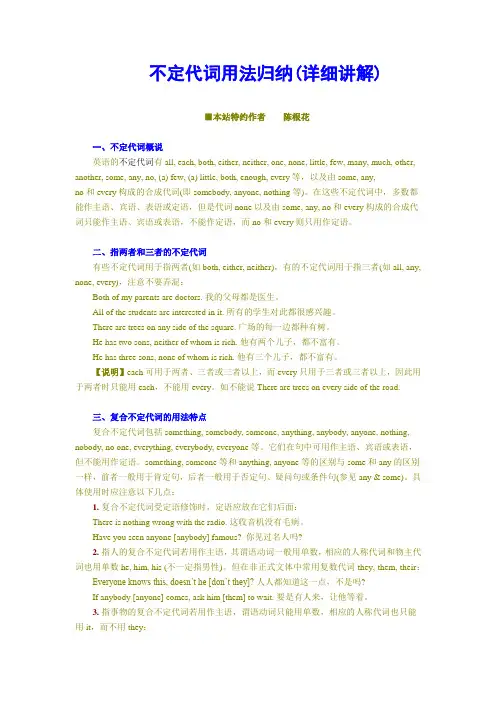
不定代词用法归纳(详细讲解)■本站特约作者陈根花一、不定代词概说英语的不定代词有 all, each, both, either, neither, one, none, little, few, many, much, other, another, some, any, no, (a) few, (a) little, both, enough, every 等,以及由 some, any,no 和 every 构成的合成代词(即somebody, anyone, nothing 等)。
在这些不定代词中,多数都能作主语、宾语、表语或定语,但是代词 none 以及由 some, any, no 和 every 构成的合成代词只能作主语、宾语或表语,不能作定语,而 no 和 every 则只用作定语。
二、指两者和三者的不定代词有些不定代词用于指两者(如both, either, neither),有的不定代词用于指三者(如all, any, none, every),注意不要弄混:Both of my parents are doctors. 我的父母都是医生。
All of the students are interested in it. 所有的学生对此都很感兴趣。
There are trees on any side of the square. 广场的每一边都种有树。
He has two sons, neither of whom is rich. 他有两个儿子,都不富有。
He has three sons, none of whom is rich. 他有三个儿子,都不富有。
【说明】each 可用于两者、三者或三者以上,而 every 只用于三者或三者以上,因此用于两者时只能用 each,不能用 every。
如不能说 There are trees on every side of the road.三、复合不定代词的用法特点复合不定代词包括 something, somebody, someone, anything, anybody, anyone, nothing, nobody, no one, everything, everybody, everyone 等。
不定代词讲解(初中英语语法)
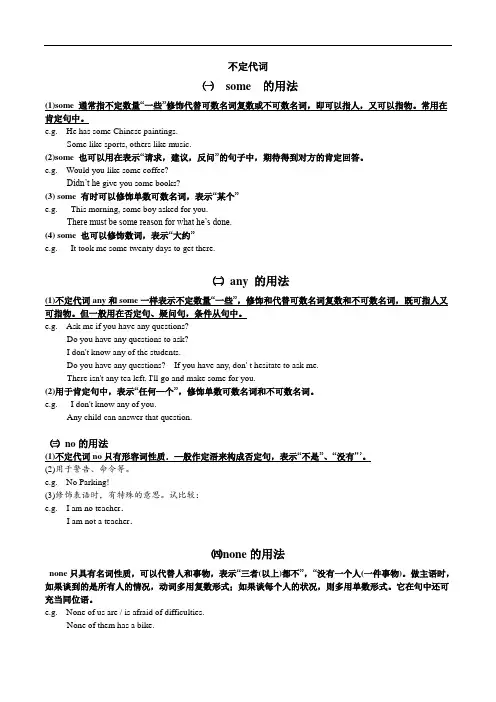
不定代词㈠some 的用法(1)some 通常指不定数量“一些”修饰代替可数名词复数或不可数名词,即可以指人,又可以指物。
常用在肯定句中。
e.g. He has some Chinese paintings.Some like sports, others like music.(2)some 也可以用在表示“请求,建议,反问”的句子中,期待得到对方的肯定回答。
e.g. Would you like some coffee?Didn’t he give you some books?(3) some 有时可以修饰单数可数名词,表示“某个”e.g. This morning, some boy asked for you.There must be some reason for what he’s done.(4) some 也可以修饰数词,表示“大约”e.g. It took me some twenty days to get there.㈡any 的用法(1)不定代词any和some一样表示不定数量“一些”,修饰和代替可数名词复数和不可数名词,既可指人又可指物。
但一般用在否定句、疑问句,条件从句中。
e.g. Ask me if you have any questions?Do you have any questions to ask?I don't know any of the students.Do you have any questions? If you have any, don' t hesitate to ask me.There isn't any tea left. I'll go and make some for you.(2)用于肯定句中,表示“任何—个”,修饰单数可数名词和不可数名词。
e.g. I don't know any of you.Any child can answer that question.㈢no的用法(1)不定代词no只有形容词性质.—般作定浯来构成否定句,表示“不是”、“没有"’。
不定代词专题讲解
不定代词1.定义:不指明代替任何特定名词或形容词的代词。
2.分类:简单不定代词和复合不定代词(1)复合不定代词:由some, any, every, no 与one, thing, body构成的不定代词。
e.g. something, someone, somebody.(2)简单不定代词:all, both, none, either, neither, each, other(s),another, much, many, few, a few, little, a little.3.用法:(1) some和any的用法:①some(一些)和any(任何)既可以修饰可数名词复数,也可以修饰不可数名词。
some多用于肯定句,any用于否定句和疑问句。
e.g. ——Are there any apples in the box?——Yes, there are some. /No, there aren’t any.——Is there any water in the bottle?——Yes, there is some water. /No, there isn’t any water.②注意:如果是表示委婉请求,希望得到对方的肯定回答时,用some.e.g. ——Would you like some tea?——No, thanks./Yes, please.——Could you mind lending me some books?——Of course not.③some(某一)和any(任一)修饰可数名词单数,不限制范围。
e.g. some person某个人any day任意一天(2) many, much和a lot of(=lots of)的用法:①它们的意思均为“许多”。
但many只可以修饰可数名词复数,much只修饰不可数名词,a lot of (lots of)既可以修饰可数名词复数,也可以修饰不可数名词;e.g. I have many /a lot of/lots of books.She needs much/ a lot of/ lots of milk.②too many 和too much 表示“太多的”,修饰名词,too many修饰可数名词复数;too much修饰不可数名词;e.g. There are too many books on the table.I ate too much milk yesterday, so I don’t feel well now.③much too表示“太”,相当于副词的用法,可修饰形容词及副词,不存在many too。
不定代词讲解及练习
语法不定代词讲解及练习不定代词讲解:不指明代替任何特定名词的代词叫不定代词。
常见的有:some, any, many, much, all, none, both, either, neither, another, other, the other, others等以及由some, any, no与body, thing, one, where等组合成的复合不定代词。
一、some/any/no1. 一般用法:some和any可与单、复数名词或不可数名词连用。
Some一般用于肯定句;any多用于疑问句、否定句或条件句;no= not any,通常用作定语,修饰可数或不可数名词。
He has some Chinese paintings.Do you have any questions to ask me?There is no milk in the glass.2. 特殊用法:1) some可用在肯定疑问句中,表示说话人认为对方的答案会是肯定的或期望得到肯定回答;在表示请求、建议、征求对方意见以及邀请时也用some。
Would you like some bananas? / Why don’t you buy some sweets?2) some和any还可以用来修饰单数可数名词,这时some表示“某一个”,any表示“任何一个”:There must be some job that you can do well.(一定有某种你能做好的工作)You can come any day you like.二、a lot of/ many/ muchMany和much 都表示许多,但many修饰或代替复数可数名词,much修饰或代替不可数名词。
A lot of许多,可以修饰可数名词和不可数名词,只能用于肯定句。
在否定句中分别用many和much代替。
A lot of people got hurt in the accident, including many students.There isn’t much rain in Xuzhou in winter.He has got many model planes, but I don’t have any.三、1. both both 作主语时,谓语动词用复数。
不定代词讲解及练习总结
不定代词讲解及练习总结1. 不定代词的定义不定代词是一类特殊的代词,用来指代人或事物,但没有具体指向的对象。
它们可以在句子中作主语、宾语或定语,并且具有不确定性。
常见的不定代词有:somebody, anybody, nobody, something, anything, nothing等。
2. 不定代词的用法不定代词在句子中的位置和用法与普通的代词相似,根据具体语境决定。
2.1 主语位置不定代词可以作为句子的主语,例如:- Somebody called me yesterday.(有人昨天给我打电话。
)- Anything is possible.(一切皆有可能。
)2.2 宾语位置不定代词可以作为及物动词的宾语,例如:- I can't find anybody here.(我在这里找不到任何人。
)- Have you seen something strange?(你见过什么奇怪的东西吗?)2.3 定语位置不定代词可以用作名词的修饰语,例如:- Is there anything important in the letter?(信中有重要的东西吗?)- I need somebody reliable to help me.(我需要一个可靠的人来帮助我。
)3. 不定代词的练为了更好地掌握不定代词的用法,以下是一些练题:3.1 单项选择题a) Everybodyb) Nobodyc) Anybody2. I don't have ____ to wear to the party.a) somethingb) anythingc) nothing3. ____ is waiting for you outside.a) Somebodyb) Anybodyc) Nobody3.2 句子改写题将以下句子改写成含有不定代词的句子:1. We have a lot of books.(改写成含不定代词的句子)2. The teacher needs a volunteer.(改写成含不定代词的句子)4. 总结不定代词在英语中起着重要的作用,它们可以用来指代不确定的人或事物,并且可以在句子中的不同位置使用。
不定代词的讲解
不定代词
(一)、不定代词的概念
先说说什么叫不定代词。
所谓“不定”,就是“不确定”“不明确”的意思,所以不定代词就是指不明确表示代替某特定名词或形容词的代词,如someone/somebody意为“某人”,something意为“某事”或“某物”,everyone意为“每一个人”,nothing意为“无关紧要的事或东西”(含否定的意味);nobody意为“没有人”(含否定的意味)等等。
(二)、不定代词的用法。
不定代词往往被看成整体,具有单数的含义,因此通常被看成是单数第三人称。
当它们充当句子的主语时,其后的谓语动词用单数形式。
如:
① Is everyone here today? 今天,大家都到齐了吗?
② Nothing is difficult if you put your heart
into it.
世上无难事,只怕有心人。
③ Everyone in our class studies hard.。
- 1、下载文档前请自行甄别文档内容的完整性,平台不提供额外的编辑、内容补充、找答案等附加服务。
- 2、"仅部分预览"的文档,不可在线预览部分如存在完整性等问题,可反馈申请退款(可完整预览的文档不适用该条件!)。
- 3、如文档侵犯您的权益,请联系客服反馈,我们会尽快为您处理(人工客服工作时间:9:00-18:30)。
不定代词讲解与习题 .不定代词讲解与习题 .不定代词用法注意点:1. one, some与any:1) one可以泛指任何人,也可特指,复数为ones。
a. one作为代词可以指人,也可以指物。
b. one,ones (one的复数形式) 可用来代替前面出现过的少数名词,以避免重复。
c. one的前面可用this,that,the,which等词来修饰。
d. 常有a+形容词+one这一形式。
it和one的用法区别:it用来指特定的东西,而one则用于替代不特定的东西some多用于肯定句,any多用于疑问句和否定句。
One should learn to think of others.Have you any bookmarks no, i don’t have any bookmarks.I have some questions to ask.2) some可用于疑问句中,表示盼望得到肯定的答复,或者表示建议,请求等。
would you like some bananas could you give me some money3) some 和any修饰可数名词单数时,some表示某个,any表示任何一个。
i have read this article in some magazine. please correct the mistakes, ifany.4) some和数词连用表示“大约”,any可与比较级连用表示程度。
there are some 3,000 students in this school. do you feel any better toda y2. each和every:a. each用来指两个或两个以上的人或物中的一个。
every则指两个以上的人或物中的一个。
b. 从含义和语法功能上看,each是“单个”的意思,侧重个体,在句中可作主语、同位语、定语和宾语。
而every是“每一个”之意,侧重全体、整体、共性。
在句中只能作定语,也就是说它后面必须跟着名词。
而由every构成的合成词后面绝不能跟名词。
each强调个别,代表的数可以是两个或两个以上,而every强调整体,所指的数必须是三个或三个以上。
each student has a pocket dictionary. / each (of us) has a dictionary. / we e ach have a dictionary.every student has strong and weak points. / every one of us has strong and we ak points.3. none和no:no等于not any,作定语。
none作主语或宾语,代替不可数名词,谓语用单数,代替可数名词,谓语单复数皆可以。
there is no water in the bottle.how much water is there in the bottle none.none of the students are (is) afraid of difficulties.4. other和another:a. another=another"另一个”,泛指众多者中的另一个,在原有基础上自然增加的另一个。
一般后面接单数名词,前面不能加定冠词。
有时another可以用在复数名词前表示“又”“再”,如:i want to have another two cakes.我想再吃两个蛋糕。
b.the other表示两个中的另一个,常与one连用。
常见形式是“one...the other...”。
c. other+复数名词=othersd. the other+复数名词=the others1) other泛指“另外的,别的”常与其他词连用,如:the other day, every other week, some other reason, no other way,the other特指两者中的另外一个,复数为the others。
如:he held a book in one hand and his notes in the other.two students in our class failed, but all the others passed the exam.2) another指“又一个,另一个”无所指,复数形式是others,泛指“别的人或事”如:i don’t like this shirt, please show me another (one).the trousers are too long, please give me another pair / some others.some like football, while others like basketball.5. all和both, neither和either两者三者都both all都不neither none任何either any在…之间between amongboth表示“两者都……”,而a11表示“三个或三个以上的人或物都……”。
a11、both在句中放在be动词,情态动词及助动词之后,放在实义动词之前。
either:指两者中的任意一个。
作主语谓语用单数。
neither:指两者都不,全否定。
作主语谓语用单数。
both:指两者都。
作主语谓语用复数。
all表示不可数名词时,其谓语动词用单数。
both和all加否定词表示部分否定,全部否定用neither和none.all of the books are not written in english. / not all of the books are written in english. both of us are not teachers. / not both of us are teach ers. / either of us is a teacher.6. many和muchmany只能和复数可数名词连用。
much注意:a lot of/lots of / plenty of=much/manya large/great number of=manya great/good deal of=much7. a few,little,a littlefew,little表示否定含义,“很少”“几乎没有”;a few,a little表示肯定含义,有一些”。
few,a few用在可数名词前,little,a little用在不可数名词前。
只能和不可数名词连用。
!注意:人称排列:单数排列顺序为:你,他/ 她,我you , he/ she and i复数排列顺序为:你们,我们,他们may come to my house ____ this week ____ next week.A .neither; orB .from; toC .either;or D. either; nordon't think we can do it all ____.A. by ourselvesB. by myselfC. by ourself D .by yourselves don't want this shirt. Please show me ____.A .othersB .the othersC .anotherD .the othercan't repair the model ship ____. Can you help ?A .me; me B. myself ;myself C .myself ;me D. me ; myselfyour brother often wash clothes ?A. he B .himself C. herself D .him6. We study Chinese, English , maths and some subjects.A .the other B. one C .other D .anotherhave two sisters. of them are doctors.A. BothB. All C .Either D. Neitherbook on the shelf is . She wrote name on its cover .A .Hers; her ;herself B. Her; hers; herselfC. Herself; her; hers D .Her; herself; herself9. "Don't worry . There's much wrong with you." said the doctor.A. nothing B .everything C. something D .veryshoes are too small. You may buy some ____ shoes.A .anotherB .otherC .the .others D. othersasked Jim and Bob to come to my house for dinner , but ____ of them came .A .another B. other C .the others D .othersare ____ the same size , so you may take ____ half of the cake.A. at; eachB. in; both C .at; neither D .in; eitherand John have come back , but ____ students in the class aren't here yet.A. the other B others C. another D. the othersmother is kindness ____.A .itself B. herself D .himselfstayed there longer than ____.A. anyone B .anything else C. anybody D .anybody elsethis her bike No, it isn't . It's ____.A. mineB. myC. meD. he's17. ____ Li Ping's brother.A. HerB. HisC. He'sD. She'sis a boy. name is Wang Bing.A. HeB. HisC. HerD. He's's this .A. It's a breadB. It is a breadC. It's breadD. This's breadbowls are on the table .There are some eggs in .A. theB. themC. itD. hehave a meeting .A. me B. you C. us D. me22. Mother often sees on Sunday .A. her all friendsB. all her friendC. her friendsD. her all friend.you see Tom and his sister , tell that mother is waiting at the gate.A. his ;hisB. her; hersC. them ; theirD. his ; herwants you to talk about China.A .anythingB .nothing C. thing D .somethingseems ill . Are you sure it's ?A .nothing serious B. anything seriousC. serious nothingD. serious anything1. — Here is a schoolbag. Whose is it — Oh, it's_________. Thank you.A. myB. mineC. me2. — Here is a schoolbag. Whose is it — Oh, it's_________. Thank you.A. myB. mineC. me3. Mrs. Brown is nice. Every day she tried to cook__________for me during my stay in Canada.A. something differentB. anything differentC. noting different4. Mrs. Brown is nice. Every day she tried to cook__________for me during my stay in Canada.A. something differentB. anything differentC. noting different5. --- How is Helen in the new school--- She is doing very well. There is ______ to worry about.A.SomethingB. anythingC. nothingD. everything6. --We have red and yellow T-shirts. Which color do you like-- I'm afraid______. 1 think blue will be OK.A. bothB. eitherC. neitherD. none。
